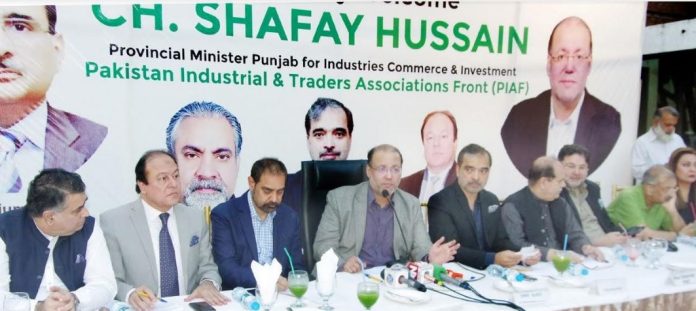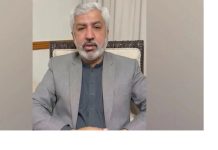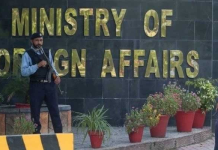DNA
LAHORE: Provincial Industries & Commerce Minister Chaudhry Shafay Hussain has said that the Punjab government has banned to build industrial estates on any agricultural land and no new industrial estate will be established until the settlement of the existing industrial estates. In the same ways real estate business will not be allowed in industrial estates either and the owners of the land in any industrial estate will be asked to set up only manufacturing unit on every plot acquired for that purpose.
He was addressing the members of the Pakistan Industrial and Traders Associations Front (PIAF), during a meeting held here at PIAF Office with its Chairman Faheemur Rehman Saigol in the chair. During the meeting, the problems faced by industry and trade were also discussed. Besides, FPCCI former president Irfan Iqbal Sheikh, various trade and industrial associations’ heads were also present in the meeting.
“If the manufacturing unit is not installed in the industrial estate, the plot will be cancelled,” he added. He said that it has been decided to increase the scope of business facilitation centers. The provincial minister said that there is a big potential in the country, if it is taken advantage of, there will be no need to take a loan from any financial institution. Planning is being done to shift the industry to solar and if cheap electricity is available through solar, then the industry will also be promoted. There have been useful discussions with foreign companies regarding the production of solar panels in Punjab.
He said that delegations of chip manufacturing companies of China have met him and expressed interest in investing in the manufacturing of chips and other cards. They wanted to set up a chip manufacturing plant in Punjab, therefore, land would be given then in Bhalwal Industrial Estate.
Provincial Minister said that there is a wide scope for investment in the industrial zones of Punjab. Special Economic Zones have ten years of income tax exemption and one time duty free machinery import facility. The Chinese company will provide all possible facilities to invest in the industrial zone.
He said that there is a wide scope of investment in chip and card manufacturing. The Punjab government is ready to provide all possible support to the Chinese companies to set up a chip manufacturing plant.
Chaudhry Shafi Hussain said that it is my determination to bring new investment in Punjab. There is an investor-friendly environment in the province. All possible facilities are being provided to domestic and foreign investors under one roof.
PIAF Chairman Faheemur Rehman Saigol, addressing the meeting, said that high cost of doing business has proved to be dangerous for businesses, as ever-increasing cost of production is the real threat to the economy amidst frequent upward revisions in policy rate and continuous fluctuations in rupee against dollar.
PIAF Chairman said that constant hike in power tariff has pushed the electricity prices higher and added to the already soaring cost of trade and industry. He asked the government to shut down all expensive oil-based power plants to ensure availability of cheaper energy for consumers. He condemned the government for shifting power distribution companies’ inefficiencies’ burden to the consumers by jacking up the tariff under the guise of Fuel Charges Adjustment. He observed that the aggressive economic measures, high borrowing rates, inflation, oppressive taxation and unstable currency have been negatively affecting running businesses.
With a view to deal with fiscal challenges, he asked the economic managers to work on the three-way strategy by implementing short-term goals that will help to keep generating resources for smooth fiscal operations, medium-term goals where the they should focus on financial inclusion, documenting the economy by designing a system where all businesses can be registered and properly document their income including collection of sales tax, initiating the process of privatization as well as improving governance by introducing reforms in each sector. As a long-term goal, the country must focus on improving its human capital, and revamping IT sectors by extending facilitations and providing all the requisite supports. In the same way, we also need to work on designing a comprehensive and proactive strategy to tackle challenges related to strengthening border security and implementing effective and comprehensive Anti-Money Laundering and Terrorist Financing measures holding accountable and taking to task all those who are involved in illegitimate activities, undermining both our economy and national interests.
















